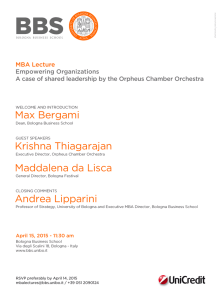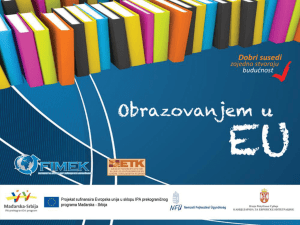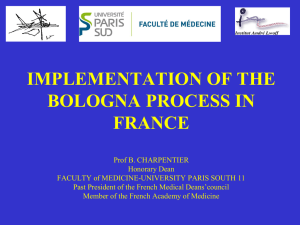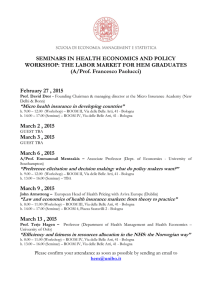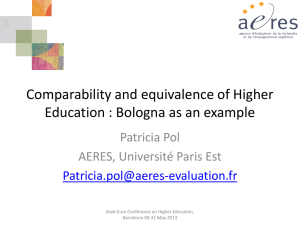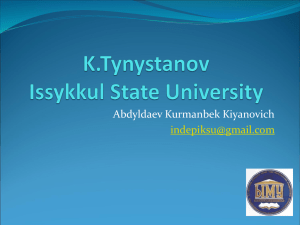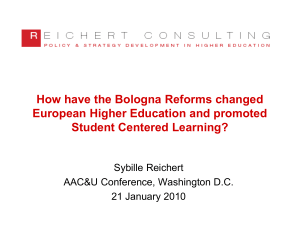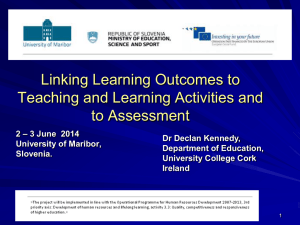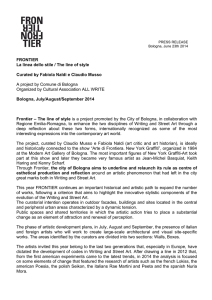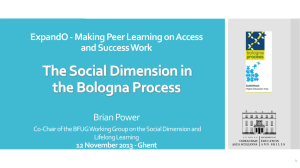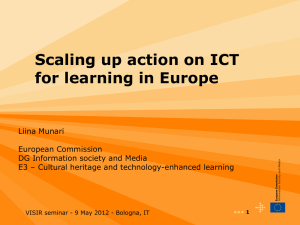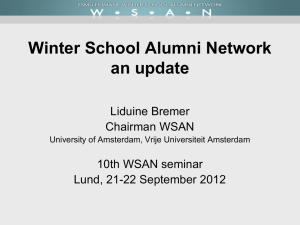Bologna experts
advertisement
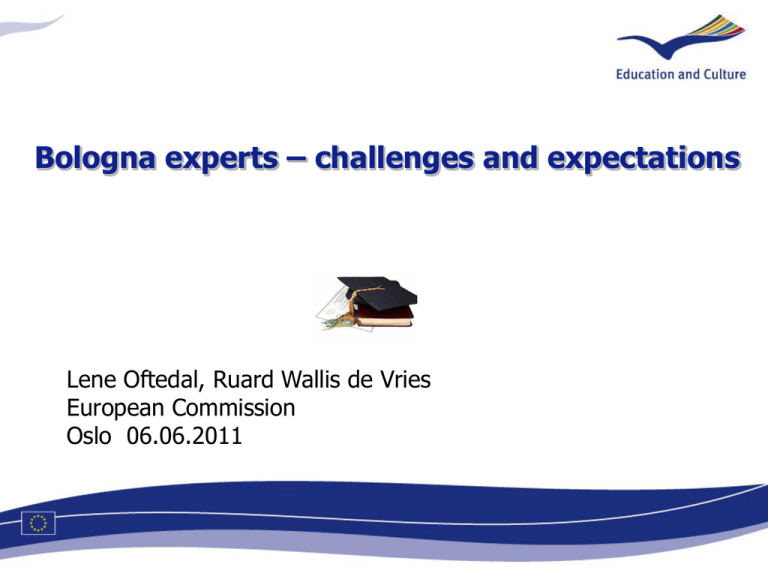
Bologna experts – challenges and expectations Lene Oftedal, Ruard Wallis de Vries European Commission Oslo 06.06.2011 Outline presentation 1. 2. 3. 4. 5. The Challenges for Higher Education The Policy Context National teams of Bologna experts The trainings Conclusions 2 Challenges for Higher Education • Access, participation and successful completion of studies • Deliver high quality education and research • Need to improve tranversal skills (critical thinking creativity, entrepeneurial skills, flexibility, language skills • Need to improve the knowledge triangle to obtain excellence Challenges cont. • • • • • • Deliver high quality education and research Massification Graduate unemployability International cooperation Increase Learning Mobility Equality of opportunities in higher education Europe2020 benchmarks Early School Leaving 2008 14.9% 2020 10% at most Higher Education Attainment (Age 30-34) 2008 33% 2020 40% at least 27, 5 Ireland 49, 9 32, 1 Denmark 47, 0 21, 2 Luxembourg 46, 1 31, 8 Sweden 45, 8 40, 3 Finland 45, 7 31, 1 Cyprus 45, 1 35, 2 Belgium 44, 4 42, 6 43, 8 Lithuania 27, 4 France 43, 5 29, 0 United Kingdom 43, 0 26, 5 Netherlands 41, 4 29, 2 Spain 40, 6 30, 8 Estonia 40, 0 12, 5 Poland 35, 3 18, 5 Slovenia 33, 6 18, 6 Latvia 32, 3 25, 7 Germany 29, 8 25, 4 Greece 28, 4 19, 5 Bulgaria 27, 7 14, 8 Hungary 25, 7 15, 9 Austria 23, 5 11, 3 Portugal 23, 5 10, 6 Slovakia 2000 22, 1 13, 7 Czech Republic 2010 20, 4 11, 6 Italy 19, 8 7, 4 M alta 18, 6 8, 9 Romania 18, 1 16. 2 Croatia 22, 6 32, 6 Iceland 40, 9 (: ) Turkey 15. 5 37, 3 Norway (%) Benchmark 2020 34, 8 22, 4 EU 27 47, 3 0 5 10 15 20 25 30 35 Source: DG Education and Culture – Data source: Eurostat (LFS) Note: Croatia: 2002 instead of 2000. Luxembourg and Malta: 2010 data is provisional 40 45 50 European Policy Context • Europe2020 • The Bologna Process • Education&Training 2020 • Modernisation of Higher Education 8 European tools • Open Method of Coordination • Programmes – LLP, Erasmus Mundus, Marie Curie (FP7) • Transparency tools : European Credit and Transfer System and Diploma Supplement – ECTS & DS, rankings • EU plays facilitating, agenda-setting and benchmarking role • NAs to coordinate the national teams • Bologna experts – executive role National Teams of Bologna experts • Since 2004 • Actors: the Commission, the LLP National Authorities, the LLP NA, the Bologna Experts • Based on: the Lifelong Learning Programme, the Invitation to submit, National Applications, Activity Plans • Co-financing: Activity Plans up to 90% co-financed by the EU Commission • Purpose, framework, tasks, profile National Teams of Bologna experts Purpose • to provide a pool of expertise to promote and enhance progress toward higher education reform in the LLP countries. • The Activity Plan for the National Teams will make sure that all those involved in Higher Education on a national level benefit from the pan-European nature of these reforms. National Teams of Bologna experts Framework • Category I: Implementing the Bologna Process reforms and/or • Category II: Promoting European Union initiatives and programmes in the field of higher education, and in relation to the Bologna Process National Teams of Bologna experts Tasks - At national level. Priorities: • promoting the use of Bologna-approved tools of recognition, such as ECTS, the Diploma Supplement and the Learning Agreement. This includes assistance in the preparation and assessment of ECTS and DS labels applications. • assistance in setting up National Qualification Frameworks. • assistance to higher education institutions in setting up internal quality assurance systems at HEI level. National Teams of Bologna experts Tasks - at international level. • Participate in European training events • Invite Bologna Experts from other National Teams to provide advice and assistance • Organisation of events involving Bologna Experts from various countries • ECTS visits : Bologna Experts from other National Teams may be invited to advise higher education institutions on the correct implementation of ECTS. National Teams of Bologna experts Profile • “peer-to-peer” exercise. • Bologna Experts are professionals active in higher education advising their colleagues on how best to introduce higher education reforms. • The Experts do not replace the work done by Ministries … • Balanced team, covering Bologna priorities. Students National Teams of Bologna experts Profile - Members of the National Team are to hold one of the following positions (or a combination thereof): • (Vice-)Rectors • Deans • Senior Academics • Directors of Study • International Relations Officers • Higher Education Experts Bologna experts’ training • • • • • Learn more about keys issues Discuss with and learn from peers Get inspired Active participation Bring knowledge back home to be a better activist for reforming higher education What’s next • 2 more years with the Higher Education Reform Project/National teams of Bologna experts – 2012-2013 • Training in focus areas to improve mobility, recognition, social dimension • Implementation of ECTS and DS • Communication on Modernisation of Higher Education (autumn 2011) and Bologna 2012 Communiqué will be agenda setting Thank you for your attention ! Please, feel free to contact us : Lene.oftedal@ec.europa.eu Ruard.wallis-de-vries@ec.europa.eu and read more on DG EAC’s website: http://ec.europa.eu/education/index_en.htm
